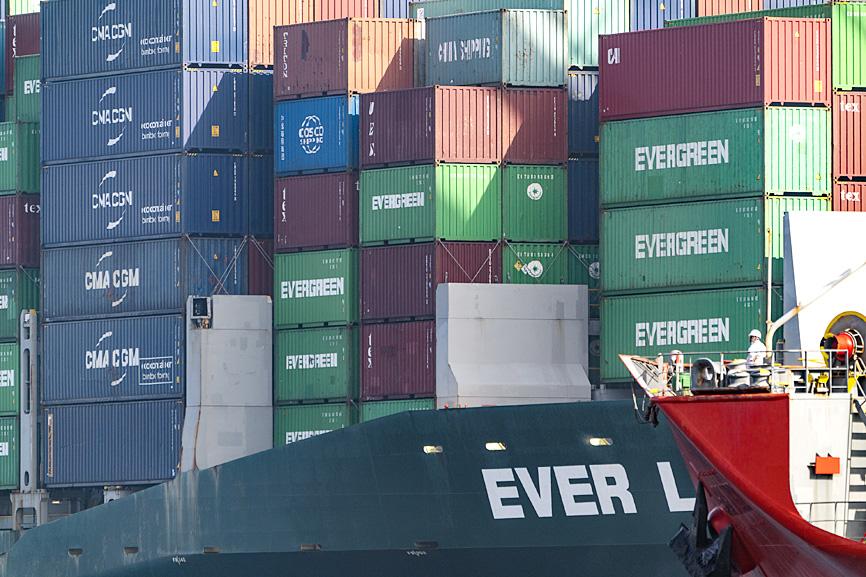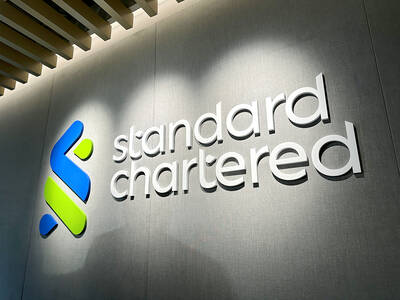Companies listed on the Taiwan Stock Exchange (TWSE) and the over-the-counter (OTC) market raked in a record NT$918.1 billion (US$33.1 billion) in the first nine months of this year, the Financial Supervisory Commission said.
The figure represented an increase of NT$545.8 billion, or 146.6 percent, from a year earlier, commission data showed.
It comprises NT$881.4 billion from companies listed on the TWSE and NT$36.7 billion from firms listed on the OTC market, the data showed.

Photo: AP
The growth largely came from logistics service providers, which charged higher freight rates due to a global supply shortage and port congestion, the commission said.
In addition, the electronics industry benefited from international brands’ new device launches, including smartphones, which boosted shipments, especially for the semiconductor industry, it said.
In the first nine months, listed shipping companies’ profit from overseas investments reached NT$294.7 billion, soaring NT$273.2 billion from a year earlier, making the industry the most profitable among all of the sectors that benefited from overseas investments, the data showed.
The semiconductor industry posted an annual increase of NT$49.9 billion, or an almost 200 percent rise in the nine-month period, while other electronics firms posted a NT$47 billion increase in overseas profit for a nearly 100 percent rise, the data showed.
A total of 1,280 listed firms had invested overseas as of the end of the third quarter, accounting for 78 percent of all listed companies, and their total investments had reached NT$7.02 trillion, up NT$205 billion from the end of last year, the commission said.
Most of the increase came after many Taiwanese firms, led by semiconductor suppliers, set up subsidiaries or launched mergers and acquisitions to expand their operations, Securities and Futures Bureau Deputy Director-General Tsai Li-ling (蔡麗玲) said.
Listed firms investing in China reported a record NT$379.5 billion in total profit in the first nine months, rising NT$102.6 billion from a year earlier, the commission said.
The figure comprises NT$357 billion posted by companies listed on the TWSE and NT$22.5 billion by those listed on the OTC market, the commission said.
The increase reflects solid demand for a wide range of products, such as smartphones, raw materials, and computers and peripheral devices, as well as chemical products, it said.
As of the end of September, 1,202 listed companies had invested in China, accounting for 73.5 percent of the companies listed on local equity markets. They had invested NT$5.4 trillion in China, up NT$18.8 billion from the end of last year, the commission said.
The Chinese market has become part of many listed Taiwanese firms’ global expansion strategies, with the companies increasingly seeing China as a place to raise investment capital, either through the establishment of subsidiaries or mergers and acquisitions, Tsai said.

South Korea’s equity benchmark yesterday crossed a new milestone just a month after surpassing the once-unthinkable 5,000 mark as surging global memory demand powers the country’s biggest chipmakers. The KOSPI advanced as much as 2.6 percent to a record 6,123, with Samsung Electronics Co and SK Hynix Inc each gaining more than 2 percent. With the benchmark now up 45 percent this year, South Korea’s stock market capitalization has also moved past France’s, following last month’s overtaking of Germany’s. Long overlooked by foreign funds, despite being undervalued, South Korean stocks have now emerged as clear winners in the global market. The so-called “artificial intelligence

Chinese artificial intelligence (AI) start-up DeepSeek’s (深度求索) latest AI model, set to be released as soon as next week, was trained on Nvidia Corp’s most advanced AI chip, the Blackwell, a senior official of US President Donald Trump’s administration said on Monday, in what could represent a violation of US export controls. The US believes DeepSeek will remove the technical indicators that might reveal its use of American AI chips, the official said, adding that the Blackwells are likely clustered at its data center in Inner Mongolia, an autonomous region of China. The person declined to say how the US government received

FORTUNES REVERSED: The new 15 percent levies left countries with a 10 percent tariff worse off and stripped away the advantage of those with a 15 percent rate In a swift reversal of fortunes, countries that had been hardest hit by US President Donald Trump’s tariffs have emerged as the biggest winners from the US Supreme Court’s decision to strike down his emergency levies. China, India and Brazil are among those now seeing lower tariff rates for shipments to the US after the court ruled Trump’s use of the International Emergency Economic Powers Act to impose duties was illegal. While Trump subsequently announced plans for a 15 percent global rate, Bloomberg Economics said that would mean an average effective tariff rate of about 12 percent — the lowest since

Standard Chartered Bank Taiwan’s newly appointed chief executive officer, Anthony Yu (游天立), yesterday unveiled an ambitious growth strategy for the bank’s wealth management division, reflecting a bullish outlook on Taiwan’s high-net-worth market. Yu, the first local executive to lead Standard Chartered Bank’s Taiwan operations, emphasized rising client demand and detailed plans to expand the bank’s digital capabilities, as well as its physical presence across the country. Standard Chartered Taiwan saw a remarkable surge in new wealth management clients last month, with the number of clients holding assets equivalent to US$1 million more than doubling compared with the same month last year, he